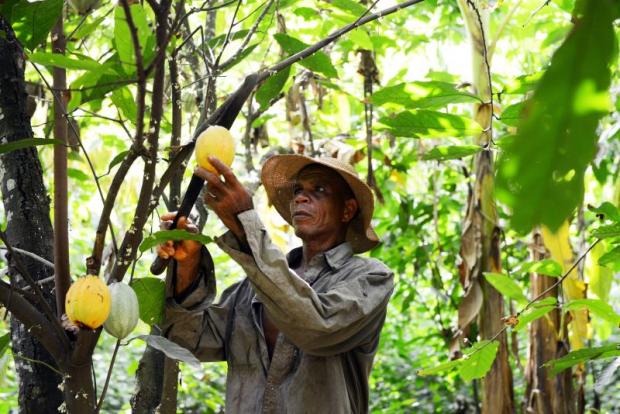
Tropenbos International Ghana has call on government to have a drastic change in the cocoa sector to halt deforestation in Ghana.
According to the Non Governmental Organization, the past and present governments have not had the courage to deal with cocoa encroachment into forest reserves due to the commodity’s contribution to the economy and the large scale nature of the encroachment.
Tropenbos International Ghana which aims at bridging the gap between forest policy, management and science, providing a forum for discussing forest issues, and carrying out relevant research and training.
Speaking at a press conference held in Accra today, the National Project Coordinator of Tropenbos Ghana Daniel Kofi Abu said, the objective of the programme is that forestry actors in Ghana deploy sound and adequate information for poverty reduction policies that improve forest-dependent livelihoods and increase forest cover and services in rural areas.
According to Mr Abu, agriculture expansion, especially cocoa encroachment into forest reserves, rising population, illegal logging, extraction of wood for fuel illegal mining and mineral exploration have been the key drivers of deforestation in Ghana(MLRN, 2012).
“Ghana stands to lose more forest from cocoa encroachment in the coming years if usual approach in forest management and governance continues”, he said.
The project coordinator also said, cocoa production per hectares has declined substantially in Ghana owing to ageing trees, poor farm management practices, stressed cocoa strands resulting from removal of shade trees, the swollen shoot virus disease, ageing farmers with little or no training, inadequate investment in farms and land tenure.
The research which was based on literature review, analysis of satellite images , participatory rural appraisal(PRA) techniques, community consultations, interviews and fields visits in three forest namely Krokosua hills, Sui river and Tano Offin and seven fringe communities. The three reserves form part of the six Hotspot Intervention Areas (HIAs) under the Ghana Cocoa Forest REDD+.
Challenges
The project coordinator said cocoa encroachment into forest reserves are driven by proximate causes and underlying factors (Geist and Lambin 2002). The proximate causes include low cocoa productivity per hectare, the need for cultivable land for crop farming and the limited availability of land due to large area of land attributed to forest reserves.
Mr Abu revealed that, chiefs, politicians and other elites do not take actions and even actively promote forest encroachment.
“Some chiefs in the western North Regions opposed the designation of their lands as forest reserves and openly sold demarcated forest reserves to migrant farmers in the 1960-70(Amanor, 2005; England, 1963)”, he said.
He further added that, the laws banning farming in the forest reserves are not enforced.
Recommendations
Tropenbos International Ghana suggest that the government of Ghana must openly recognize the extent of degradation of its forest reserves, assess their status and redefine management objectives and management regimes for different categories of reserves.
“Chiefs, politicians and other elites should be encouraged to lead the fight against cocoa encroachment into forest reserves. Civil Society organizations (CSOs) should also lead the campaign to name and shame recalcitrant ones”
The NGO also suggest the Forestry Commission should be well equipped to enforce laws banning farming in forest reserves. The commission should be provided with personnel and equipment to enable it undertakes real time monitoring, patrol and enforcement of forest law.
Source: Ghana/Starrfm.com.gh/103.5FM/Prince Essien

